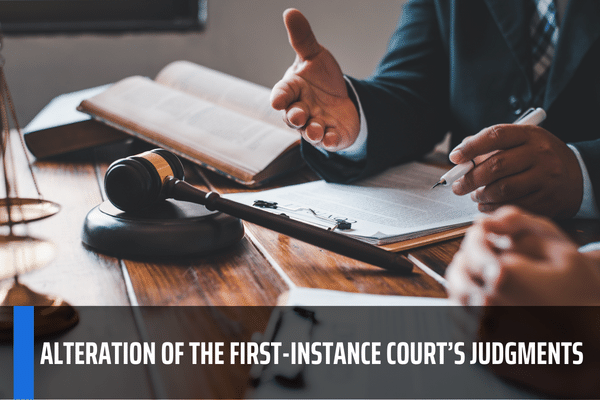Vietnam: What are the bases for appellate jurisdiction to alter the court’s judgments in a more favorable direction regarding the application of circumstances aggravating the criminal liability of the defendant?
- Which agency has appellate jurisdiction in Vietnam?
- Vietnam: What are the bases for appellate jurisdiction to alter the court’s judgments in a more favorable direction regarding the application of circumstances aggravating criminal liability?
- What is the authority for appellate jurisdiction to alter of the first-instance court’s judgments in Vietnam?
Which agency has appellate jurisdiction in Vietnam?
Pursuant to Article 344 of the Criminal Procedure Code 2015 provides as follows:
Appellate jurisdiction
1. A provincial People’s Court shall have appellate jurisdiction over a district People’s Court's judgments and rulings being appealed.
2. The higher People’s Court shall have appellate jurisdiction over a provincial's judgments and rulings being appealed. However, such appellate jurisdiction shall be subject to territorial jurisdiction.
3. A military court of a military zone shall have appellate jurisdiction over a local military court's judgments and rulings being appealed.
4. The Central military court shall have appellate jurisdiction over the judgments and rulings that were passed by a military court of a military zone and are being appealed.
Accordingly, the competent authority to adjudicate includes:
- Provincial People’s Court
- Higher People’s Court
- Military court of a military zone
- Central military court

Vietnam: What are the bases for appellate jurisdiction to alter the court’s judgments in a more favorable direction regarding the application of circumstances aggravating the criminal liability of the defendant?
Vietnam: What are the bases for appellate jurisdiction to alter the court’s judgments in a more favorable direction regarding the application of circumstances aggravating criminal liability?
Pursuant to Article 345 of the Criminal Procedure Code 2015 stipulates as follows:
Scope of appellate jurisdiction
An appellate court shall review the content of sentences and rulings being appealed. It can review other parts of such sentences and rulings, which are not appealed, if necessary.
Pursuant to subsection 4, Section II of Official Letter 206/TANDTC-PC in 2022, as follows:
4. The appellate trial panel has the right to amend the first-instance judgment in a more favorable direction in terms of court costs and improper application of aggravating circumstances. Based on what provisions of law for the Appellate Trial Panel to correct these contents?
Although Clause 1, Article 357 of the Code of Criminal Procedure does not stipulate that the Appellate Trial Panel has the right to amend the first-instance judgment on court costs, the application of aggravating circumstances is incorrect. If the correction of these two contents is favorable to the defendant, the trial panel may apply the provisions of Article 345 of the Code of Criminal Procedure on the appellate trial scope to correct these two contents of the first-instance judgment. . However, the decision part of the judgment should be based on both Article 345 and Article 357 of the Code of Criminal Procedure.
Thus, although the appellate trial panel does not stipulate that the appellate trial panel has the right to amend the first-instance judgment on the application of improper criminal liability aggravating circumstances in favor of the defendant.
However, it is possible that based on Article 345 of the Criminal Procedure Code 2015, the appellate trial panel may consider the content of the appealed or protested judgment or decision. If deemed necessary, other parts of the judgment or decision may not be appealed or protested in order to amend the first-instance judgment on the application of improper criminal liability aggravating circumstances in favor of the defendant
Note: The decision part of the judgment should be based on both Article 345 of the Criminal Procedure Code 2015 and Article 357 of the Criminal Procedure Code 2015.
See the full content of Official Dispatch 206/TANDTC-PC 2022: Click here
What is the authority for appellate jurisdiction to alter of the first-instance court’s judgments in Vietnam?
Pursuant to Article 375 of the Criminal Procedure Code 2015 stipulates as follows:
Alteration of the first-instance court’s judgments
1. In the presence of new facts or grounds showing the disparity in the first-instance court’s judgments and the defendant’s personal records or nature, degree and consequences of the crimes, the Trial panel of the appellate court shall be entitled to alter the first-instance court’s judgments as follows:
a) Exempt the defendant from criminal liabilities or penalties; enforce no additional penalty or judicial remedy;
b) Implement articles and sections of the Criminal Code on lesser crimes;
c) Mitigate the defendant’s punishments;
d) Lessen the compensation level and amend the rulings on the handling of evidences;
dd) Commute a punishment to a less harsh one;
e) Sustain or alleviate a jail sentence and grant a suspended sentence.
2. At the requests by the Procuracy or crime victims, the Trial panel of the appellate court can:
a) Aggravate punishments and implement articles and sections of the Criminal Code on harsher crimes; pass additional punishments and implement judicial remedies;
b) Increase the compensation level;
c) Replace existing punishments with harsher ones;
d) Nullify suspended sentence.
The trial panel, if acquiring sufficient justifications, can mitigate punishments and implement articles and sections of the Criminal Code on lesser crimes, commute existing punishments to less harsher ones, sustain and suspend jail sentence and reduce the compensation level.
3. The trail panel of the appellate court, if possessing satisfactory grounds, can alter the first-instance court’s judgments, as per Section 1 of this Article, for the defendants filing or facing no appeal.
Accordingly, the appellate trial panel has the right to alter the first-instance judgment as follows:
- Exempt the defendant from criminal liabilities or penalties; enforce no additional penalty or judicial remedy;
- Implement articles and sections of the Criminal Code on lesser crimes;
- Mitigate the defendant’s punishments;
- Lessen the compensation level and amend the rulings on the handling of evidence;
- Commute a punishment to a less harsh one;
- Sustain or alleviate a jail sentence and grant a suspended sentence.
LawNet
